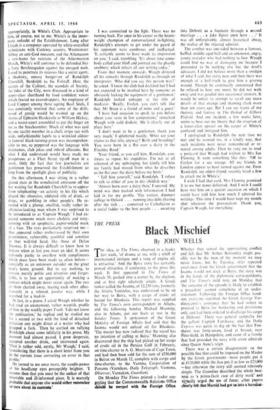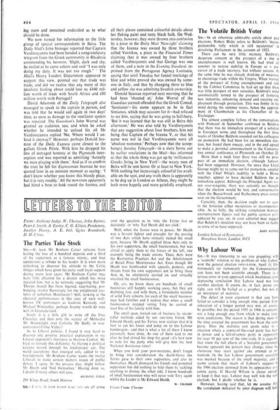THE PRESS
Black Mischief
By JOHN WELLS
THE idea, as The Times observed in a leader last week, 'of drama at sea, with a whiff of international intrigue and a tang of engine oil, is attractive.' And the Beira story has certainly proved attractive, if confusing, to the press this week. It first appeared in The Times of March 30, pushed into a corner by the election, and at first sight relatively simple. A Greek tanker called the Ioanna, of 12,230 tons, formerly the Arietta Venizelos, was understood to be on her way to Beira, with a cargo of crude oil bound for Rhodesia. This report was supplied by The Times's own correspondent in Athens, and the following Sunday Michael Manning, also in Athens, put our fears at rest in the Sunday Times. A spokesman of the Greek Ministry of Foreign Affairs had said that the Joanna would not unload oil for Rhodesia. The master has now radioed that the vessel has no intention of calling at Beira.' Manning also discovered that the ship had picked up her cargo of crude oil in the Persian Gulf in February, on time-charter to A. G. Morrison of Cape Town, and had then been sold for the sum of £536,000 in Beirut on March 12, complete with cargo and time-charter, to the Vamma Corporation of Panama (Vamilcos, Daily Telegraph; Varnima, Observer; Vamakon, Guardian).
On Monday The Times printed a leader sug- gesting that the Commonwealth Relations Office should be merged with the Foreign Office. Whether they sensed the approaching conflict and felt that Mr Arthur Bottomlcy might pos- sibly not be the man of the moment we may never know, but by Tuesday, after repeated assurances from the Greek government that the loanna ould not dock at Beira, the story was in the hands of the diplomatic correspondents, and The Times's mild note on Monday that `the outcome of the episode is likely to establish a precedent' seemed something of an under- statement. Following the Foreign Office hand- out, everyone reprinted the Greek George Var. dinoyannis's assurance that 'he had orders to proceed to Beira for bunkering and provisions only and had been ordered to discharge his cargo at Djibouti.' There was general sympathy for the gallant Captain Fanshawe, and the Daily Express was quick to dig up the fact that Fan- shawe was forty-seven, lived at Stroud, near Petersfield, in Hampshire, and came of a family that had provided the navy with seven admirals since Queen Anne's reign.
There was a certain disagreement on the possible fine that could be imposed on the Master by the Greek government—most people put it at £120,000 while the Sun put it as low as £25,000 —but otherwise the story still seemed relatively simple. The Guardian described the whole busi- neis as 'a prima-facie case of dirty work' and virtually urged the use of force; other papers clearly felt that Harold had got us into a humiliat-
mg mess and remained undecided as to what should be done.
We now turned for information to the little group of special correspondents in Beira. The Daily Mail's John Stenager reported that Captain Vardinoyannis had been handed a congratulatory telegram from the Greek community in Rhodesia commending his heroism. 'Slight, dark and shy, he smiled as he came ashore and said "1 was only doing my duty. It was not too rough." The Mail's Heavy Leaders Department appeared to support this view, pointed out that trade was trade, and did we realise that any more of this idealistic fooling about could lose us f440 mil- lion worth of trade with South Africa and £80 million worth with Portugal?
David Adamson of the Daily Telegraph also managed to speak to the captain in person, and was told that he would sail again in two days' time, as soon as damage to the ventilator system was repaired. The Guardian's John Worral was granted an audience, too, and when he asked whether he intended to unload his oil Mr Vardinoyannis replied 'No. Where would I un- load it anyway?' However, perhaps Donald Sea- man of the Daily Express came closest to the gallant Greek Pirate. With him he dropped his line of outraged honesty at the Plymouth inter- ception and was reported as admitting 'Actually we were playing with them.' And as if to confirm the trust he felt for Expressman Seaman he was quoted later in an intimate moment as saying: 'I don't know whether you know this bloody place, but it is very muddy.' All the newsmen apparently had hired a boat to look round the Joanna, and all their pieces contained colourful details about her flaking paint and rusty black hulk. On Wed- nesday, however, they were thrown into confusion by a piece in the Daily Mail `Newsighe claiming that the Joanna was owned by three brothers called Varnikos, a piece in the Financial Times claiming that it was owned by four brothers called Vardinoyannis and that George was one of them, and a note in the Evening Standard, re- printed from the Portuguese Agency Lusitania, saying that until Tuesday her funnel markings of blue and white proved she was owned by some- one in Italy, and that by changing them to blue and yellow she was admitting Swedish ownership.
Donald Seaman reported next morning that he had been `shouted at,' John Worral of the Guardian seemed offended that the Greek Consul, 'Samianos'—his name appears to be in fact Simianos, which may account for it—had refused to see him, saying that he was going to Salisbury. `But it was learned that he was still in Beira this afternoon.' He was also told by Vardinoyannis that any suggestion about four brothers, him not being that Captain of the Joanna V, or that his name was not in fact Vardinoyannis were all `absolute nonsense.' Perhaps now that the scoop- hungry Sunday Telegraph—in a story borne out by earlier revelations in the Mail—has informed us that the whole thing was got up by 'millionaire Greeks living in New York'—the weary men of Beira will be sent home. Or at least to New York. With nothing but increasingly colourful lies avail- able on the spot, and any truth there is apparently to be dug up in London or Athens, they might be both more happily and more gainfully employed.



































 Previous page
Previous page